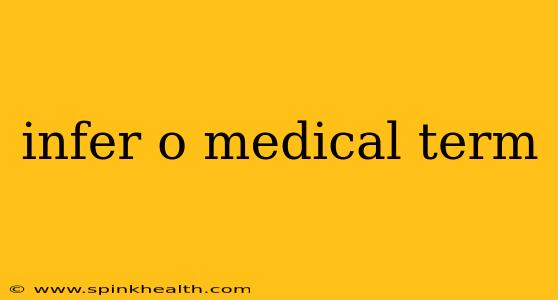Infer: Unraveling the Mystery Behind Medical Inference
The word "infer" itself isn't a medical term, but it's a crucial skill in the medical profession. Doctors, nurses, and other healthcare professionals constantly use inference—the act of deducing conclusions from available evidence—to diagnose illnesses, predict patient outcomes, and make critical treatment decisions. It's a process that weaves together seemingly disparate pieces of information, much like solving a complex puzzle.
Let's explore how inference plays out in the medical world, addressing some common questions along the way.
What does "infer" mean in a medical context?
In medicine, "infer" means drawing conclusions based on symptoms, test results, patient history, and clinical judgment. It's not about guessing; it's about using a systematic approach to analyze available data and reach a probable diagnosis or prognosis. For instance, if a patient presents with a persistent cough, fever, and shortness of breath, a doctor might infer that they have pneumonia. This conclusion isn't guaranteed, but it's a logical deduction based on common symptoms.
How do doctors use inference in diagnosis?
Imagine a patient complaining of chest pain. A doctor won't simply accept this at face value. They'll use inference to gather more information: Is the pain sharp or dull? Where is it located? Does it radiate anywhere else? Does it worsen with certain activities? Combining these answers with the patient's medical history, family history, and the results of physical examinations and tests (like an EKG or blood tests), the doctor can infer the likely cause of the chest pain – it could be angina, a heart attack, acid reflux, or something else entirely.
What are some examples of medical inference?
Inference is pervasive in medicine. Here are a few examples:
- Identifying a bacterial infection: A patient's high white blood cell count, fever, and localized inflammation could infer a bacterial infection. Further tests would confirm the specific bacteria.
- Assessing the severity of an injury: The amount of bleeding, the location of an injury, and a patient's response to stimuli can help clinicians infer the severity of a traumatic injury.
- Predicting patient outcomes: Based on a patient's response to treatment, medical history, and the nature of their illness, doctors can infer the likelihood of successful recovery or the potential for complications.
Is medical inference always accurate?
No, medical inference is not always accurate. It's based on probabilities and patterns, and there's always a degree of uncertainty. Further investigations, like diagnostic imaging or specialized tests, may be necessary to confirm or refute initial inferences. The art of medicine lies in carefully weighing the available evidence, acknowledging uncertainties, and adapting treatment plans as new information emerges.
The power of inference in medicine lies in its ability to guide clinical decision-making, even in the face of incomplete information. It's a skill honed through years of training and experience, combining knowledge, critical thinking, and a deep understanding of human biology. While not a medical term itself, "infer" encapsulates a fundamental process that underpins the practice of medicine.

